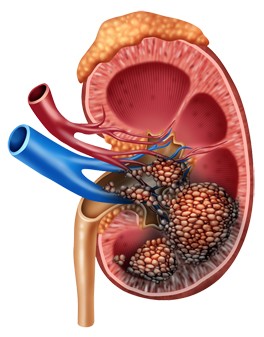Free Case Evaluation
You will never be charged a fee unless a recovery is made for you.
We are no longer accepting new cases.
Research suggests that prolonged exposure to PFAS in drinking water may increase the risk of kidney cancer. As a result, people who have been exposed to PFAS in their drinking water and developed kidney cancer are filing PFAS lawsuits.
Kidney cancer, also known as renal cancer, is a disease where malignant cells form in the tissues of the kidneys, the organs responsible for filtering blood and producing urine. The most common type, renal cell carcinoma (RCC), accounts for about 90 percent of cases. Symptoms may include blood in the urine, persistent pain in the side or back, unexplained weight loss, or fatigue. When detected early, kidney cancer has a 5-year survival rate of approximately 76 percent for localized cases. Regular screenings for kidney cancer are vital, especially for individuals exposed to environmental toxins like PFAS in drinking water.

Per- and polyfluoroalkyl substances (PFAS), often called “forever chemicals,” are synthetic compounds used since the 1940s in products like nonstick cookware, water-repellent fabrics, food packaging, and aqueous film-forming foam (AFFF) for firefighting. Their strong chemical bonds make them resistant to degradation, leading to persistent contamination of soil, air, and water. PFAS such as perfluorooctanoic acid (PFOA) and perfluorooctane sulfonate (PFOS) are found in approximately 45 percent of U.S. tap water, accumulating in the body over time and posing potential health risks.
PFAS enter drinking water through various pathways, including industrial discharges, landfill runoff, wastewater treatment plants, and AFFF used in firefighting at military bases and airports. These chemicals spread into groundwater and surface water, contaminating municipal and private well water supplies. The widespread presence of PFAS in drinking water affects communities across urban and rural areas, exposing millions to low but cumulative levels of these chemicals.
Emerging research suggests that prolonged exposure to PFAS in drinking water may increase the risk of kidney cancer, particularly in areas with high contamination levels.
While the exact mechanisms and extent of the risk are still under study, the evidence points to a dose-response relationship, where higher and longer-term PFAS exposure increases the likelihood of kidney cancer.
The link between PFAS-contaminated drinking water and kidney cancer is supported by growing evidence, though more research is needed to fully understand the extent of the risk. The absolute risk remains relatively low, but chronic exposure to PFAS in water supplies is a concern, particularly in heavily contaminated areas. If you experience symptoms like blood in the urine or persistent side pain, consult a healthcare provider promptly. Staying informed and proactive can help protect your health.
If you have testicular or kidney cancer or ulcerative colitis and were regularly exposed to PFAS in drinking water, you may be entitled to compensation for medical bills, lost wages, loss of consortium, and more. Contact us for a free consultation.
Sources
Abrams, Z. (2025, January 14). Study links PFAS contamination of drinking water to a range of rare cancers. Retrieved from https://keck.usc.edu/study-links-pfas-contamination-of-drinking-water-to-a-range-of-rare-cancers
American Cancer Society. (2024, May 31). PFOA, PFOS, and Related PFAS Chemicals. Retrieved from https://www.cancer.org/cancer/risk-prevention/chemicals/teflon-and-perfluorooctanoic-acid-pfoa.html
C8 Science Panel. (2012). Probable Link Evaluation for Kidney Cancer. Retrieved from http://www.c8sciencepanel.org/prob_link.html
Hofmann, J., et al. (2024, August 24). Serum concentrations of per- and polyfluoroalkyl substances (PFAS) and risk of renal cell carcinoma: Recent findings from prospective cohorts. Retrieved from https://ehp.niehs.nih.gov/doi/10.1289/isee.2024.1013
National Cancer Institute. (n.d.). PFAS Exposure and Risk of Cancer. Retrieved from https://dceg.cancer.gov/research/what-we-study/pfas
Winquist, A., et al. (2023, December 13). Case–Cohort Study of the Association between PFAS and Selected Cancers among Participants in the American Cancer Society’s Cancer Prevention Study II LifeLink Cohort. Retrieved from https://ehp.niehs.nih.gov/doi/full/10.1289/EHP13174
You will never be charged a fee unless a recovery is made for you.